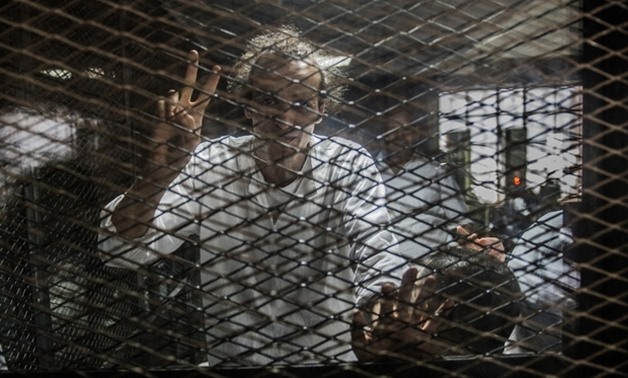
Detained photojournalist Mahmoud Abu Zeid during one of his trails - AFP
CAIRO – 23 April 2018: Amid the controversy that has been raised inside and outside of Egypt surrounding the decision award photojournalist Mahmoud Abu Zeid, known as "Shawkan", the 2018 UNESCO/Guillermo Cano World Press Freedom Prize on April 23, the debate is expected to intensify with Egypt’s Parliament’s slamming of the decision.
“The choice of Mahmoud Abu Zeid pays tribute to his courage, resistance and commitment to freedom of expression,” said Maria Ressa, president of the jury.
Egypt’s Parliament Speaker Ali Abdel Aal shortly later criticized the announcement, saying that UNESCO shouldn’t be involved in any political matters, as its major interests should remain in culture.
He added in a short speech during Parliament’s session Monday that Shawkan is still on trail, and it is not accepted for such an international organization to grant the Press Freedom prize to someone who is still facing criminal charges. “These political stances are backed by specific governments known with their support to terrorism. This will never be accepted by Egypt’s Parliament, especially that Egypt has been a UNESCO member since 1945,” Abdel Aal stated.
Chairman of Parliament’s Human Rights Committee, Alaa Abed, denounced the selection of Shawkan as well, affirming that there is a wealth of criminal evidence against Shawkan that proves that he cooperated with international organizations working against Egypt, and sent them photos from the Rabaa dispersal representing things contrary to the truth.
Meanwhile, the Ministry of Foreign Affairs issued a firm statement on Sunday expressing its regret over being informed of UNESCO’s intention to grant Shawkan the award.
According to the statement, the FM assigned Egypt’s Permanent Representative to UNESCO to submit a complete file, including the charges drawn against Shawkan to the international organization.
“These charges are purely of criminal nature, and they are not related to freedom of press and expression,” said the statement. The ministry added that “Shawkan’s nomination for the award was motivated by a number of non-governmental organizations, including ones driven by Qatar, which is known for their support of the Muslim Brotherhood terror group.”
Ahmed Abu Zeid, the ministry’s spokesperson, said that “it is inconceivable or acceptable for UNESCO to be trapped in politicization, nepotism, and being involved in the agenda of certain countries.”
One of the most complicated cases?
Both the nomination and final announcement created a wide debate on social media. Some refuse the nomination saying that the UNESCO is undermining the Egyptian judicial process and is challenging its transparency and fairness, while other activists said that Shawkan sooner or later will be released, because “he was only doing his job in when the dispersal took place in Rabaa”, and accordingly receiving the award was “fair” from their point of view.
Shawkan’s case may be considered one of the most complicated cases. The photojournalist has been defended by several human rights NGOs and activists, while he is being tried in the same case known as the “Dispersal of Rabaa sit-in.” The case consists of 366 defendants, including outlawed Muslim Brotherhood leaders Mohamed Badie, Mohamed el-Beltagy and Essam el-Erian, which might weaken Shawkan’s position.
Freelance photojournalist Shawkan, 31, is to be tried alongside defendants who are accused of a list of charges, including: launching arson attacks on public utilities, resisting authorities, possessing unlicensed weapons, blocking roads, premeditated murder and organizing an armed gathering in Rabaa Square.
However, lawyer Karim Abdel Rady assured in previous statements to Egypt Today that “there was no evidence against Shawkan to prove he was involved in any violent act, and that he was on assignment to cover the dispersal like any other journalist.”
Last month, the prosecutor recommended the death sentence for all defendants in the case.
Reporters Without Borders launched a campaign last week in support of Shawkan’s release, which many journalists from around the world took part in.
On Sunday, the Photojournalists Department at the Press Syndicate in Egypt affirmed its “full support and trust in Shawkan’s innocence,” adding that there are documents proving his coverage assignment.
Egypt’s Government has repeatedly denied the presence of political prisoners in Egypt, ensuring that judicial procedures are taken into account in accordance with Egyptian law.
In October 2016, President Sisi announced the formation of a presidential pardon committee, to examine prisoners’ cases similar to Shawkan and determine who deserves to be pardoned.
Three batches, making up hundreds of prisoners, were pardoned per presidential decrees over the past two years; a fourth batch is expected to be announced soon.

Comments
Leave a Comment